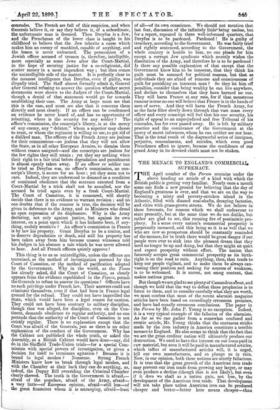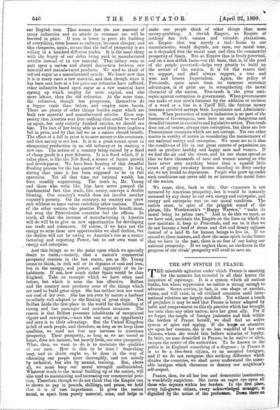'THE MENACE TO ENGLAND'S COMMERCIAL, SUPREMACY. T HE April number of
the Forum contains under the above heading an article of a kind with which the British public is getting very familiar. Nearly once a month some one finds a new ground for believing that the day of England's greatness is over, and that we are on the way to becoming a misty and poverty-stricken island in the Atlantic, filled with disused coal-shafts, decaying factories, and cities with grass-grown streets. We do not believe in these forecasts, for reasons which we shall endeavour to state presently, but at the same time we do not dislike, bat rather are glad to see, this running fire of pessimistic pro- phecy. In a sense every nation's commercial prosperity is perpetually menaced, and this being so it is as well that we who are now so prosperous should be constantly reminded of the menace, for in truth there would be great danger if our, people were ever to sink into the pleasant dream that they need no longer be up and doing, but that they might sit quiet and expect prosperity without effort. The nation that fatuously accepts great commercial prosperity as its birth- right is on the road to ruin. Anything, then, that tends to keep our people vigilant, and to make them be always can- vassing their position and seeking for sources of weakness, is to be welcomed. It is unrest, not smug content, that makes nations great.
But though we are glad to see plenty of Cassandras about, and though we hold that the way to defeat those prophecies is to listen to them, and to consider carefully what they are worth, we must confess that most of the recent alarmist magazine articles have been based on exceedingly erroneous premises, and have had equally erroneous conclusions. The paper in the Forum by Mr. John P. Young is no exception. Indeed, it is a very typical example of the fallacies of the alarmists. As far as we can gather from a somewhat confused and erratic article, Mr. Yonne- thinks that the enormous strides made by the iron industry in America constitute a terrible menace to England. He also seems to think that the fact that we are the great creditor nation will ultimately produce our destruction. We used to have the interest on our loans paid in raw material, but soon it will be paid in manufactured articles, which influx of manufactured articles will, it is urged, kill our own manufactures, and so plunge us in ruin. Now, in our opinion, both these notions are utterly fallacious. It is true that the great growth of the American iron trade may prevent our iron trade from growing any larger, or may even produce a decline (though that is not likely), but even if it does we shall as a nation gain, not lose, by the development of the American iron trade. That development :will not take place unless American iron can be produced cheaper and better—better here means cheaper—than our English iron. That means that the raw material of many industries and an article in constant use will be lowered in price. If iron is lower in price the building of everything, from houses to railways, becomes cheaper, and this cheapness, again, means that the ball of prosperity is set rolling in a hundred different trades. It is the same thing with the bogey of our debts being paid in manufactured articles instead of in raw material. That fallacy rests in part upon a useless and absurd distinction between raw material and manufactured products. We used to think of refined ngar as a manufactured article. We know now that it is in many cases a raw material, and that though since it has been sent here at a low price our refineries have suffered, other industries based upon sugar as a raw material have sprung up which employ far more capital, and also more labour, than the old refineries. At the same time, the refineries, though less prosperous, themselves do a bigger trade than before, and employ more hands. There are plenty of other things besides sugar which are both raw material and manufactured articles. Even sup- posing that America sent here nothing that could be worked up again, but only entirely finished articles, we should not lose. The fact of her being able to send them here implies a fall in price, and by that fall we as a nation should benefit. The effect of a fall in price is to save money to the consumer, and that saving is not lost. It is to a great extent spent in cheapening production in an old industry or in starting a new one. The notion of a country being ruined by a flood of cheap goods is a pure delusion. It is a flood which, if it takes place, is like the Nile flood, a source of future growth and development. We have been hearing of this dreadful flooding process for the last quarter of a century. In fact, during that time it has been supposed to be in full operation. Yet all that time our national wealth has been steadily augmenting. The truth is, Mr. Young and those who write like him have never grasped the fundamental fact that trade, like mercy, conveys a double blessing. One country's wealth does not involve another country's poverty. On the contrary, no country can grow rich without to some extent enriching other nations. Those of the other nations who practise Free-trade benefit most, but even the Protectionist countries feel the effects. In truth, all that the increase of manufacturing in America will do will be to give us new opportunities for developing our trade and commerce. Of course, if we have not the energy to seize these new opportunities we shall decline, but the decline will not be owing to America's rise as a manu- facturing and exporting Power, but to out own want of energy and enterprise.
And this brings us to the point upon which we specially desire to insist,—namely, that a nation's commercial prosperity consists in the last resort, not, as Mr. Young seems to think, in rich soil or in deposits of coal and iron, but in the energy, and power, and ingenuity of its in- habitants. If not, how much richer Spain would be than England. Take an example which we have often used before, but which is none the less effective. Belfast and the country near produces none of the things which are used to build great ships. She has neither iron nor wood nor coal of her own. She has not even by nature a harbour peculiarly well adapted to the floating of great ships. Yet Belfast holds the first place in the world for the building of strong and fast passenger and merchant steamers. The reason is that Belfast possesses inhabitants of exceptional vigour and enterprise,—men who can seize an opportunity and turn it to their advantage. But the United Kingdom is full of such people, and therefore, as long as we keep these qualities, we need not fear any increase in American prosperity. Their prosperity, as long as we are sound at home, does not menace, but merely feeds, our own prosperity. What, then, we want to do is to maintain the qualities of our race. How is this to be done ? Something may, and no doubt ought to, be done in the way of educating our people more thoroughly, and not merely by technical, but also by mental, training. But, above all, we must keep our moral strength undiminished. Whatever tends to the moral building up of the nation, will also tend to maintaining and increasing our commercial posi- tion. Therefore, though we do not think that the Empire can be Shown to pay in pounds, shillings, and pence, we hold that it is of vast importance. It gives the nation moral, as apart from purely material, aims, and helps to make our people think' of other things than mere money-grubbing. A slavish Empire, an Empire of nothing but rich estates and valuable plantations, an Empire that was merely a tied - house to our, manufactories, would degrade, not raise, our moral tone, as it degraded first the moral tone and then the commercial. prosperity of Spain. But an Empire that is freely governed, and on a non-selfish basis—on the basis, that is, of the good- of the people governed—helps very greatly to build up the morale of the nation. It is for this reason that we support, and shall always support, a true and wise and honest Imperialism. Again, the policy of Free-trade, quite apart from its immense economic advantages, is of great use in strengthening the moral: character of the nation. Free-trade is the great anti- septic against corruption in government. When governments can make or mar men's fortunes by the addition or excision of a word or a line in a Tariff Bill, the furious money interests involved corrupt both Legislature and Administra- tion. When protection of native industries is no part of the business of Government, men have no such dangerous and dreadful interest in executive and legislative action. Free-trade does not, of course, always cure corruption, but there are few Protectionist countries which are not corrupt. Yet one other matter is worthy of notice in considering the maintenance of our national energy and enterprise. We must see to it that the conditions of life in our great centres of population are such as produce healthy and happy men and women. If we foul the air and the rivers, and let our slums spread so that we have thousands of men and women among us who have never seen anything better than a squalid little street of grimy two-story e'houses standing in dirty smoky air, we are bound to degenerate. People who grow up under such conditions can never add to or increase the moral force of the nation.
We come, then, back to this. Our commerce is not menaced by American prosperity, but it would be instantly menaced by any decay in our own energy and enterprise, and energy and enterprise rest on our moral condition. The nation must, in spite of the priggish sound of the phrase, like Wordsworth's "Happy Warrior," "make its moral being its prime care." And to do this we must, as we have said, maintain the Empire on the lines on which we- now maintain it, keep to Free-trade, and see to it that we do not become a land of slums and dirt and dreary ugliness instead of a land fit for human beings to live in. If we attend to these matters, and show the same spirit in the future that we have in the past, there is no fear of our losing our national prosperity. If we neglect them, no slackness in the progress of our rivals' prosperity will avail to save us.







































 Previous page
Previous page